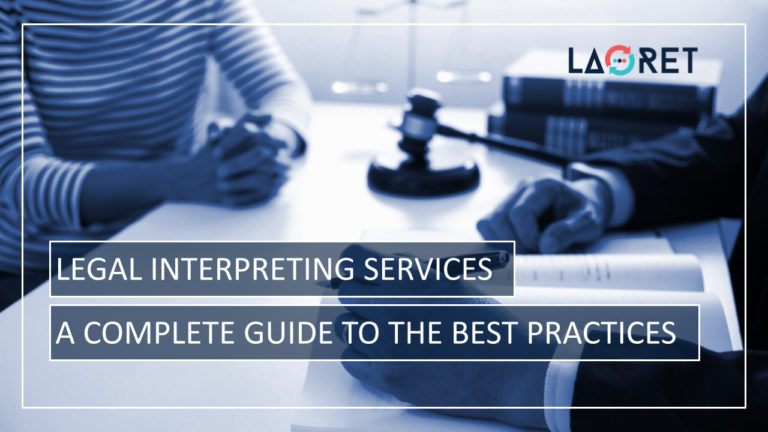Legal Interpreting Services: A Complete Guide To The Best Practices
Legal Interpretation services are all about accuracy, confidentiality, diplomacy, and a timely delivery according to the set demands.
But what does legal interpreting really involve? What are the facets linked to this service? And how can you make sure that you will be receiving the best possible experts for your specific legal proceedings?
The Modes Of Legal Interpreting
Legal Interpreting can take many different forms and will require different subject-matter experts depending on the legal event taking place. So let’s start by discussing the different modes of legal interpreting. What kind of interpreting service can be provided and what makes each of them so challenging?
- Simultaneous Interpretation refers to the type of interpreting where the legal interpreter will convey the messages as they are being spoken. Since interpreting and speaking both happen simultaneously, i.e. almost at the same time, this is a highly intense form of interpreting which will require full concentration at all times. The simultaneous interpreting method is commonly used in proceedings such as notions and jury instructions. This technique can be applied on-site or via specialized remote platforms.
- During consecutive interpretation, the interpreter will first listen to a part of the speech (a few sentences) in the source language, before briefly halting the conversation to offer a translation and conveying that speech into the target language. While the previous mode of interpreting is seen as the most intense, consecutive is often regarded as the most challenging in terms of multi-tasking. The interpreter will need to retain all the information shared in its accurate form and combine this with taking notes. So, technically, the interpreter must listen attentively to the conversation while simultaneously taking notes, and then reconstruct it in the target language. Consecutive Interpreting can be offered on-site, in the form of Over the Phone Interpreting (OPI), or Video Remote Interpreting (VRI).
- Sight translation is required when there is an oral interpretation of a document that presents itself during the meeting. These can be police reports, waivers, rights forms…etc., where the interpreter will clarify the content and purpose of the document to the audience with limited source language proficiency. This too will require quick thinking and expertise on the interpreter’s side, since while on some occasions the document can be reviewed beforehand, this is not always a given, and anticipation of content, as well as quick reading, may be required.
What To Expect From A Qualified Legal Interpreter?
From our introduction into the modes of legal interpreting, it becomes clear that, in the legal industry, accurate communications are vital on a linguistics and technical, as well as cultural level.
That is why the ideal legal interpreter should:
- Be native to the client’s country and region as well as the language and have years of interpreting experience under their belt.
- Have a sound background in the legal industry (and detailed knowledge of the legal systems involved in the project) with a keen specialization in the type of legal proceedings they are hired to interpret for.
- Possess the ability to distinguish between technical jargon and relay the messages clearly and accurately, but also adhere to the principles of fidelity, impartiality, and confidentiality.
- Be up to date on the current legal trends in the region where the client is being presented. This is why a good court interpreter must commit to keep learning and attend workshops, meetings, and keep informed.
- Be able to handle the pressure and interact appropriately with a fast rate of speech, usage of slang, idioms and proverbs, background noise, speech defects, and accents.
- Possess any licenses and training that are required of them. For example, to be a court interpreter in the United States, you have to complete an exam orientation course, apply for a licensure and Exam Registration Form, pass a criminal history background check, and pass a commission-approved examination.1
When Are Legal Interpreters Called In?
Legal Interpreters possess different skills and expertise, and there are a number of situations where a professional interpreter’s services will prove vital. The most common ones are:
- Depositions And Testimonies: when a lawyer needs to record an official statement from a non-English speaker, the legal interpreter is provided to make sure that the exchange of information is clear, accurate, unbiased.
- Negotiations And Interviews: there are different types of negotiations or even interviews that require a lawyer’s presence. Think about contract negotiations, properties & assets, alimonies, and so on. In case of a language gap, here too the support of a legal interpreter is paramount.
- Legal Trials And Court Hearings: during a trial or hearing, each person involved should be able to receive and understand the information that is being communicated. Legal interpreters are provided for each target language, usually in a simultaneous interpreting capacity.
- Lawyer-Client Meetings: in case a client can’t be provided with a lawyer native in their language, a legal interpreter will need to be provided so that any further proceedings can be made clear.

How To Identify Qualitative Legal Interpretation Services
Yes, the legal interpreter will need to possess a lot of skills and training. But when you are trying to find an interpreter, whether independently or through a Language Service Provider (LSP), these are the qualities you need to register on their page or background information to make sure you have found a qualitative legal interpretation service.
- Privacy And Security: Legal proceedings will always need to be handled with the highest standards of confidentiality. That is why you should make sure that the interpreter or LSP you choose will adhere to these standards by offering a nondisclosure agreement and support end-to-end encryption for any online communications you may be exchanging.
- Ad Hoc Assignments: Make sure that the interpreters will be available for last-minute projects since, in the legal world, these are very likely. For this reason, keep an eye out for interpreters and LSPs who promote a 24/7 availability.
- Full-Service Contracts: Legal Interpretation needs can vary, so it is wise to keep an eye out for agencies that support small as well as large projects and can offer a full-service contract. In this case, make sure you discuss the option of a possible discount!
- Proven Expertise And Accuracy: Yes, we said before that proven experience is vital. There is simply no room for mistakes or ambiguity in Legal Translation Services, which can have serious consequences. But also make sure that any agency or interpreter you approach, communicates clear standards in the legal industry and has a track record of legal translation and interpreting services.
- Compliance With Legal Requirements: Make sure that the interpreter or LSP you hire, is set to comply with all the needed requirements and regulations. Some court interpreters, for example, will need to be court certified. Certain courts may hold their own set of rules that will need to be followed to the letter. Your agency / certified court interpreter should be aware of all of these.
- Flexibility and Technical Authority: The world has gone virtual, and interpreting services have to a large degree gone with it. This is true for any industry, and so you have to make sure that in times such as these, you will be able to rely on a service that can easily be moved to the digital realm if needed and reliable interpreting platforms are supported.
Pro Tip! Want to learn more about virtual interpreting? Check out our ultimate guide to virtual interpreting best practices!
What To Instantly Communicate To Your Legal Interpreter Or LSP To Save Time And Money
So, what about you? Is there something you can do to make sure that the legal interpreting services you request are of the best possible quality and provided in the shortest turnaround time? Then you should keep some information handy to communicate immediately and get into some details regarding the context, field and proceedings, so the best possible interpreter can be provided for you:
- Date: Your provider will have to time everything perfectly including setting up the right tools for your event, all the way through to selecting the right interpreter.
- On-Site or Remote: You’ll need to specify if you’ll require an interpreter to be present in-person or if you’ll need to connect with an interpreter either over the phone or via video. Both have got different types of preparations.
- The language Pair: What is the source language and what is the target language(s)? Will you need an interpreter with a specific dialect? Make sure to specify which country and region the client will be from.
- Briefing and QA: Give your provider / interpreter access to the points that will be discussed and the context of the legal procedures that will be taking place. Also, consider a QA session to clear up any possible ambiguities or challenges. Remember that this will be done in the strictest confidence!
- Attendance: The number of guests attending an event will determine how many and which tools are needed.
- Duration and Required Number of Interpreters: Not sure how you can predict the number of interpreters needed for your case? Well, think about it this way. Interpreting is a demanding profession, and in order to maintain top performance, ideally, interpreters don’t work more than 2 hours consecutively. After which, they are replaced by another interpreter. This means that for an 8-hour event, you will need at least 2 interpreters.
However, each project is different and it’s unrealistic to generalize. The best thing you can do is to communicate your project’s scope and requirements to your LSP and they can recommend what’s in your best interest.
Conclusion
Legal Interpreting services need to be performed by native professionals with a sound background in the legal industry, so that full and complete accuracy can be guaranteed. Any legal interpreter or LSP will have to adhere to certain best practices before they can be considered as a qualitative service provider in that they need to provide security and confidentiality, ad hoc services, expertise, technical authority, and full compliance with current regulations.
Laoret offers reliable Legal Interpretation Solutions provided by native, in-country interpreters highly experienced in the legal industry and with fully honed interpreting skills. We adhere to a strict, streamlined workflow developed within full confidentiality to deliver high quality products within your timeframe. We remain available 24/7 and protect all of our online interactions with end-to-end encryption.






